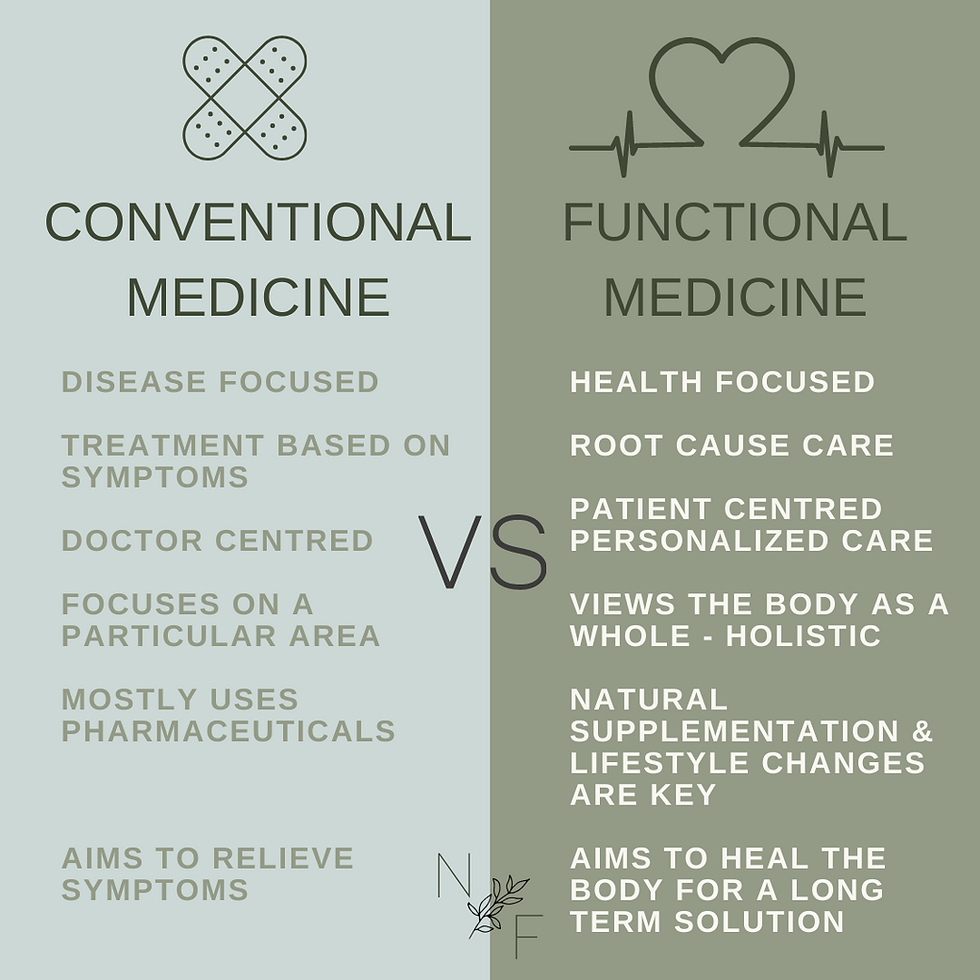What is functional medicine?
- Dr Georgina Compton

- Apr 13, 2022
- 3 min read
Updated: Oct 14, 2023
The use of the term functional medicine has exploded in the health world recently, yet many are unclear of its meaning and how its approach can help those with chronic health concerns.
Essentially, functional medicine looks to uncover and address the root causes of your health challenges, using a personalized, systems-oriented, and science-backed approach.
Similar approaches are involved in Integrative or Regenerative Medicine.
Typically those who train in functional medicine are GPs, Chiropractors, Naturopathic doctors, or Osteopaths who already have a vast amount of knowledge in human anatomy, physiology, and biochemistry. The additional study helps to solidify their understanding of what is at the root of poor health and gain clarity on the natural tools and specialized lab testing that are available.

Cutting-edge lab testing
Functional medicine practitioners prefer to test and not guess, and have a range of science-backed specialized lab tests that can really help uncover the reason for a host of health challenges. These tests are thorough and comprehensive, reducing the likelihood of false negatives.
For example, instead of a blood test for hormonal assessment, a dried urine (D.U.T.C.H.) test is preferred as it assesses a large range of bioavailable hormone metabolites.
A comprehensive stool test doesn't just look for a few common pathogenic microorganisms, but utilizes MALDI-TOF laser technology and can identify more than 1400 organisms. It also offers accurate parasite testing with 3 consecutive stool samples and PCR analysis (multiplex DNA technology).
A thorough assessment of heart (cardiovascular) health involves blood tests of over 20 biomarkers, not just cholesterol and HbA1c.
Visit our lab testing page for more info.
What is the difference between mainstream medicine and functional medicine?
The functional medicine approach is patient-centred versus doctor-centred.
A functional medicine practitioner should work with you in a therapeutic partnership to support you through the healing journey.
Functional medicine looks to address the root causes rather than simply relieve symptoms. It aims to heal the body for a long-term solution, using natural supplementation and lifestyle changes. It is a holistic, health-focused approach, and not a mechanistic or disease-focused one.

Mainstream medicine can dismiss functional medicine as quackery and unproven. Yet, in many cases we find conventional medicine is at least 10 years behind the functional medicine model. Consider the saturated fat and sugar debate as an example.
Research supporting the use of many natural therapeutics and specialized lab tests are certainly available. However, there will always be limitations while the pharmaceutical industry has a monopoly.
Furthermore, the cost of specialized functional medicine lab tests means they are not available through our government-run healthcare systems. So, medical doctors are not exposed to these highly beneficial tools and have little time to research further.
So, what leads to poor health?

- Stress - Poor gut health - Trauma (or structural issues with the body) - Toxins (environmental, medications & endotoxins) - Infection - Poor nutrition - Dehydration
I find in many cases chronic health issues are due to inflammation and hidden toxicity (from infection, mould, or other environmental exposures) and poor lifestyle choices (diet, lack of exercise etc).
There is usually not just one reason for someone's failing health. A combination of factors are involved. Restoring health for the long-term requires addressing lifestyle, environmental, and emotional contributors.
What builds health and encourages wellness?
Sunlight
Quality water
Movement
Adequate sleep
Positive thoughts
Reduced exposure to toxins
Removing toxic load and addressing underlying (and often hidden) toxic damage
Good nutrition & a healthy gut
Ultimately, functional medicine asks why function has been lost and what can be done to restore function naturally.
We make choices every day that either build health or destroy it. We also have a choice to continue covering up symptoms or address the causes. Which will you choose?
Want to work with a functional medicine practitioner to uncover and address the root causes of your chronic health concerns or simply to be at your best? Head to the work with me page to learn more.
.png)






Comments